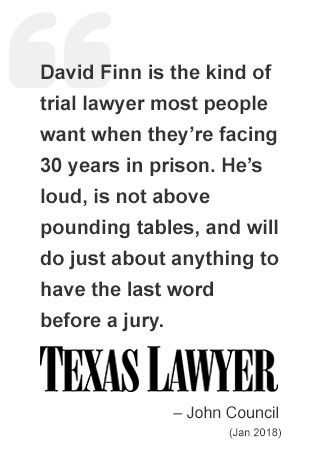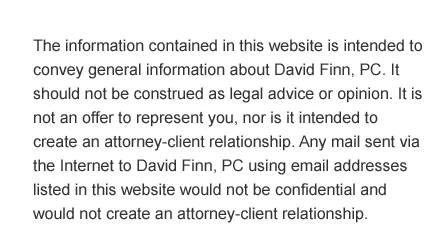


Texas State Criminal Defense Attorney
State criminal charges should be taken seriously—seek legal representation today.
If an individual violates the state laws of Texas, the state has the power to arrest, try, convict, and charge defendants for crimes such as robberies, DWIs, assaults, and homicides.
Among the most common crimes in Texas include:
- Texas Collar Crime
- DWI
- Drug Trafficking
- Sexual Assault
- Murder
- Homicide
- Intoxicated Manslaughter
- Rape
- Kidnapping
- Robbery
- Arson
- Texas Habeas Corpus
When it comes to a criminal prosecution in Texas, the state has the highest burden of proof.
Even if you are the subject of a criminal investigation,the State may not always be able to prove the charges against you.
It is imperative that you contact a state criminal defense attorney immediately. David Finn, P.C. will leave no law or defense unexplored in defending you. Call (214) 538-6629 today to schedule a confidential evaluation of your case.
Texas Misdemeanors and Felonies
In the state of Texas, criminal cases are categorized as either misdemeanors or felonies—depending on their nature and maximum punishment.
A misdemeanor in Texas is a form of misconduct which entails a punishment of a year or less in jail, along with a fine amounting to up to $4,000. Misdemeanors are further classified into three categories: Class A Misdemeanors, Class B Misdemeanors, and Class C Misdemeanors.
A felony, on the other hand, is a more serious criminal charge compared to a misdemeanor. Most criminal laws divide felonies according to various classes with different degrees of punishment. These are Capital Felonies, 1st Degree Felonies, 2nd Degree Felonies, and 3rd Degree Felonies. A felony is typically punishable by anywhere from two years to 99 years in state prison and a fine amounting to up to $10,000. Capital felonies such as murder, however, are punishable by either death or life without parole.
Whether a misdemeanor or a felony, being accused of a crime or arrested can be a terrifying experience. A criminal charge is truly a life-changing event, and can have an immense effect on your family, your way of life, and even your educational and career opportunities. It is crucial to remember, therefore, that you have rights.
Call David FinnToday
Nothing is quite as important as your freedom. If you face criminal charges, there are numerous ways in which criminal defense attorney can be of help. David Finn, P.C. will fight aggressively to protect your rights, as well as both your personal and professional future. Call (214) 538-6629 today.
About David Finn, P.C.
David Finn, P.C. is a Dallas federal and state defense attorney who has been on the Martindale-Hubbell list of Bar Preeminent Lawyers for over 13 years. This former federal prosecutor and elected criminal trial judge has consistently been named as a “Texas SuperLawyer” (2003-2018) as featured in Texas Monthly Magazine. SuperLawyers is a Thomson Reuters service. And Mr. Finn has also been consistently chosen as among the “Best Lawyers in Dallas” (2010-2018) by D Magazine in Dallas. If you are facing a criminal charge, David Finn is the criminal charge defense lawyer you want fighting for you.
General State Crimes FAQ
WHAT SHOULD I DO IF I AM STOPPED ON THE ROAD FOR POSSIBLY DRIVING UNDER THE INFLUENCE OF ALCOHOL?
First, be polite and courteous to the police officer. If the police officer believes you have been drinking, he or she will likely ask you to perform “road side tests” (e.g. walking toe to heel). If you are absolutely sure that you are not under the influence of alcohol, you may choose to perform the tests because successfully performing the tests could result in the officer allowing you to leave. On the other hand, if you have doubt about your ability to preform the tests successfully, tell the officer firmly, but politely , that you will not perform the tests without being allowed to consult with an attorney. While you do not have a right to consult with an attorney at this point, you cannot be forced to perform the roadside tests. If you are charged with driving under the influence of alcohol, the officer will testify as to how you preformed on these roadside tests and it is also possible that your performance will have been recorded on videotape.
If you fail the roadside tests or if you refuse to preform the roadside tests, you will likely be arrested. Once arrested, you will be asked to give a breath specimen and may be asked to preform additional “tests.” It is our advice that you tell the officer that you refuse to submit a breath specimen or take additional tests unless you are allowed to consult with an attorney. Again, you have no right to consult with an attorney before giving a breath specimen, but you cannot be forced to give a breath specimen. The machine that takes breath specimens is not always accurate.
HOW LONG WILL IT TAKE TO RESOLVE MY CASE IF I AM CHARGED WITH AN OFFENSE IN DALLAS COUNTY?
Cases in Dallas County often take a long time to resolve, particularly if the case is a felony. Often your case will be “passed for announcement” a few times to give the defense and the state a chance to investigate the case and several if the case can be resolved without a trial. It is up to the individual judge whether you will be required to appear in court for “announcement” settings. If the case is eventually set for a trial, it may be reset several times. Older cases and cases where the person has been incarcerated will usually be given priority.
WHAT ARE SOME OF MY IMPORTANT RIGHTS IN STATE COURT?
- You have a right to refuse to make any statements. If you have a lawyer, never make a statement to anybody without talking to your lawyer first. Do not send emails to anyone about the facts of your case. Do not talk to your family or friends about the facts of your case, either in person or over the phone.
- If you are charged with a felony, you have a right to have your case presented to a grand jury where a group of citizens vote as to whether there is probable cause to believe you committed the crime charged. If you are arrested for a felony offense before an indictment is returned, you have a right to an “examining trial” where a judge determines if probable cause exists to believe you committed the crime charged.
- If there is even the possibility you could be put in jail upon conviction of the offense, you have a right to be represented by an attorney and to have an attorney appointed by the court if you can show that you are unable to hire an attorney.
- You have a right to have the state prove any charge against you “beyond a reasonable doubt.” The “beyond a reasonable doubt” standard is the highest standard of proof that exists in the American justice system.
- You have a right to a jury trial (a jury consists of six persons in misdemeanor cases and twelve persons in felony cases). You have a right to have the jury decide your guilt and innocence, and, if it finds you guilty, you have a right to have the jury decide your sentence or punishment.
- If there is a trial, you have a right to testify at the trial. On the other hand, you cannot be forced to testify and, if you chose not to testify, that fact cannot be used against you.
- You have a right to use subpoenas to make witnesses come to court and testify on your behalf at any trial.
- You have a right, if there is a trial, to have your lawyer cross examine the state’s witnesses.
- If you lose at trial (and in some cases if you plead guilty), you have a right to appeal your case and, if you cannot afford a lawyer, you have a right to an appointed lawyer on appeal.
WHAT IS THE DIFFERENCE BETWEEN "STRAIGHT PROBATION" AND "DEFERRED ADJUDICATION PROBATION"?
With “straight probation,” even if you successfully complete the probationary period, you are considered to have been convicted of the offense for which you have been placed on probation. On the other hand, if you are placed on “deferred adjudication probation” and successfully complete the probationary period, the charge against you is dismissed and there is no conviction.
Some lawyers tell clients that if they complete “deferred adjudication probation” they will not have “a record.” This is not exactly true. There will be “a record” that you entered a plea to the charge and were put on “deferred adjudication probation” and this can have an effect for such things as applying for a permit to carry a weapon or calculating your criminal history in federal court. Still, you will not have “a conviction” and can truthfully answer “no” on job applications and alike if asked if you have ever been “convicted” of an offense.
If you are placed on “straight probation,” you are sentenced to a particular term in jail or prison and that term is probated for a particular period (for example, a sentence of 180 days probated for two years is a possible sentence for a first time DWI conviction). If you then violate “straight probation” and the probation is revoked, you can be incarcerated up to the original jail or prison term that was imposed (in the above DWl example, your sentence would be up to 180 days in jail if your probation was revoked). If you are placed on “deferred adjudication probation,” you are not sentenced to a particular jail or prison term at the time the “deferred adjudication probation” is imposed. If you violate the “deferred adjudication probation” and the probation is revoked, the judge may sentence you to any term provided by law at the time of the revocation.
There are certain offenses (e.g. driving while intoxicated) for which a judge cannot grant “deferred adjudication probation,” although the judge can still grant “straight probation.” Likewise, there are are certain offenses for which a judge cannot grant “straight probation,” although the judge can still grant “deferred adjudication probation.”
I HAVE BEEN OFFERED A PLEA BARGAIN INSTEAD OF GOING TO TRIAL. IN STATE COURT, SHOULD I ACCEPT THE PLEA BARGAIN?
It is impossible to provide a general answer to this question, although most cases are generally resolved through a plea bargain. In deciding whether to accept the plea bargain, the two most important things is to make sure you understand all the consequences of the plea bargain and to make sure you have confidence that your lawyer is acting with your best interest in mind.
Some things to make sure you understand before accepting a plea bargain in state court: (1) What will you be admitting to? (2) Does the plea bargain provide for a specific sentence? (3) If there is a jail sentence, what kind of good time credit will you be eligible for? (4) If there is a prison sentence, how will the parole laws affect your release eligibility? (5) If there is a prison sentence and you have not previously been sentenced to prison, did your lawyer explore other options such as “shock probation?” (6) If you are not a United States citizen, will the plea bargain affect your ability to remain in or re-enter the United States? (7) Will you be required to attend counseling, complete community service, submit to random drug tests, wear an electronic monitor, or register as a sex offender? The bottom line: ask questions.
I AM NOT A UNITED STATES CITIZEN, DOES THAT MAKE A DIFFERENCE?
It could. Recent changes in the immigration laws have made it very easy to deport non-citizens even for misdemeanor convictions. If you are a non-citizen, before accepting ANY plea bargain, even if it is to probation or deferred adjudication, you should make sure that your attorney fully understands any immigration consequences that may occur as a result of your plea. If you have any doubts as to your attorney’s competence in the area of immigration law whatsoever, you owe it to yourself to consult a knowledgeable immigration attorney BEFORE entering the plea. David Finn routinely consults with experienced immigration lawyers on behalf of his clients when immigration issues might arise.
I LOST MY TRIAL OR PLEADED NO CONTEST OR GUlLTY IN STATE COURT, BUT I AM NOT SATISFIED WITH THE OUTCOME, IS THERE ANYTHING I CAN DO?
Following a trial, you may appeal your case to the Texas Court of Appeals provided you file a Notice of Appeal within thirty days of your conviction. Following a plea, you may appeal your case only if the appeal concerns the trial court’s “jurisdiction” to hear your case, or the trial court denied one or more of your written motions, or if you receive permission from the trial court to appeal. A Notice of Appeal would have to be filed within thirty days.
If you lose an appeal in the Texas Court of Appeals, you can then ask the Texas Court of Criminal Appeals to consider your case and, after that. you can ask the United States Supreme Court to consider your case. The Texas Court of Criminal Appeals and the United States Supreme Court pick and choose the cases they will hear and, as a result, both courts hear only those cases raising issues that might have an effect on many different cases.
After losing an appeal, you can file a post-conviction petition for a Writ for Habeas Corpus if you believe you were denied a constitutional right or if you believe your lawyer was ineffective. Such petitions must first be filed in state court and can later be filed in federal court. However, that there are strict deadlines for filing petitions in federal court and you should consult with an experienced lawyer regarding these deadlines.
The information contained in this web site is intended to convey general information about David Finn, PC. It should not be construed as legal advice or opinion. It is not an offer to represent you, nor is it intended to create an attorney-client relationship. Any email sent via the Internet to David Finn, PC using email addresses listed in this web site would not be confidential and would not create an attorney-client relationship.
Phone Numbers
Office: (214) 538-6629







